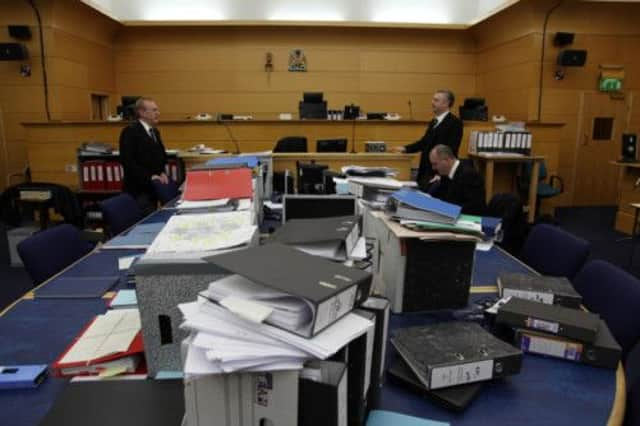Referendum question of Scots law


THE UK government seeks to apply legislation which is contrary to the rulings of the European Court and might even put the issue to a referendum. This relates specifically to prisoners’ voting rights and deportation of foreign criminals, but the potential ramifications are much wider. There are proposals now to move Europe towards full legal union, within a single jurisdiction.
This conjures an image of the USA where a number of separate states are united in one legal jurisdiction in which the legislature appears to be subject to final determination at the Supreme Court.
Advertisement
Hide AdAdvertisement
Hide AdIs David Cameron harking back in the opposite direction to the English tradition of parliamentary supremacy over judicial interpretation of legal principle?
This may be of interest in Scotland where there is an at least historical affinity with the laws of European nations and the doctrine of parliamentary supremacy has never been endorsed. That doctrine arguably emerged from the actions of the exclusively English parliament in the execution of one monarch and the dismissal of another.
Does the Scottish referendum therefore present an opportunity to relocate the Scottish jurisdiction within its European homeland, away from the United Kingdom, and to join a community of jurisdictions founded in the Roman laws from which much of Scots law originates ?
There may be some difficulties.
Scotland’s affinity with the laws of European nations might not be an affinity with European law. After all, many of these nations and their institutions have been destroyed and rebuilt in the interim in the course of events such as the French revolution and the Year of Revolutions (1848), among others.
Their own links with the Roman laws shared with Scotland during the Middle Ages are likely to have been greatly eroded by renewal and codification and may by now have little in common with Scots law. Also, it is a little difficult to repose a great deal of confidence in Scottish governmental respect for judicial interpretation.
The present Justice Minister once denigrated the UK Supreme Court as having no more legal acumen than casual tourists.
This was perhaps the mindset to which Alistair Bonnington referred in his declaration that the Scottish Parliament had done more damage to Scots law in 13 years than Westminster had done in three centuries. That declaration was hotly disputed but not effectively contradicted.
If there is any disenchantment at the Scottish Parliament towards judicial interpretation, this may arise from its being purely a creature of statute with no remit to entertain judicial guidance. This is quite different to the former Scottish parliament whose statutes appear to have been addressed directly to the judiciary in their title as the Lords of Council and Session.
Advertisement
Hide AdAdvertisement
Hide AdThen we have the evidence before us that the distinctive Scottish jurisdiction has survived more or less intact within Great Britain and the United Kingdom for those three centuries. This follows from a Treaty of Union which, with some minor exceptions, appears to have retained authority and ongoing assent throughout that period. That treaty is often seen as guaranteeing the existence of the separate laws and legal jurisdiction of Scotland for all time.
Nothing, of course, is for all time and the treaty might not quite say that anyway, but it seems to have worked to that effect at least to some extent.
This is not likely to be a burning issue in the Scottish referendum where the debate appears to be more focused on economic factors. Nevertheless, Scots law is one of the institutions which underpins the separate Scottish identity and its preservation is quite likely to be more important than transient economic conditions to the future of that identity.
The choice appears to lie between reliance upon the ongoing efficacy of the Treaty of Union within the UK on the one hand, and alignment with historic partners drawn from common ancestry in the Roman laws of medieval Europe now moving towards a unified legal jurisdiction on the other.
Are any practical consequences likely to arise from this choice? The supremacy of parliament or of the courts, the requirement for corroboration in criminal trials, adversarial trial, including trial by jury as against judicial inquisition, and the independence of the legal profession are all issues which might be approached quite differently from one option to the other.
The Scottish Law Agents Society is neutral in this issue but seeks to underline its importance and to promote informative and constructive debate. • Michael Sheridan is secretary of the Scottish Law Agents Society SEE ALSO